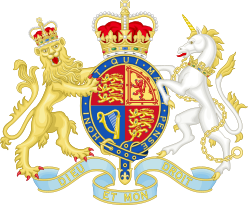 | |
| Presented | Wednesday 19 March 2014 |
|---|---|
| Country | United Kingdom |
| Parliament | 55th |
| Party | Coalition government |
| Chancellor | George Osborne |
| Total revenue | £648 billion ($1.1 trillion) (39% of 2014 GDP) |
| Total expenditures | £732 billion ($1.2 trillion) (42% of 2014 GDP) |
| Deficit | £84 billion (5% of 2014 GDP) |
| Website | Budget 2014 documents |
‹ 2013 2015› | |

The 2014 United Kingdom budget was delivered by George Osborne, the Chancellor of the Exchequer, to the House of Commons on Wednesday, 19 March 2014.
Contents
It was the fifth budget of the Conservative–Liberal Democrat coalition government formed following the 2010 general election, and also the fifth to be delivered by Osborne. [1] [2] [3] [4]